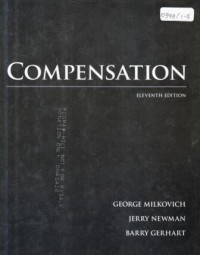Text
Compensation
A few books can change your life. Our book may not be one of them. However, if you read it, you will better understand that pay matters. After all, you can't pick up a newspaper, power up a computer, or read a blog today without someone talking about compensation. The Great Recession had major ramifications for pay. Some folks had their hours cut and/or their pay frozen or reduced. Why? Because it's a way to cut compensation costs (though not necessarily the benefits portion of compensation costs) without laying off workers. Others, of course, were laid off and lost their jobs, income, and benefits. The recession also focused attention on executive compensation. As the government bailed out the financial industry, newspapers were reporting large bo¬nuses going to the very employees who helped cause the financial disaster. With the end of the recession, we have seen employers put less emphasis on cutting labor costs and more emphasis on hiring (sometimes even in the United States). However, job growth has been modest. Why? Employers have become increasingly careful about adding new workers because they want to keep costs under control and they don't want to have to re¬duce the workforce if they guess wrong about increasing product demand (and the need for more workers). But competition for some types of workers has increased and wages, salaries, and benefits have likewise increased for such workers, meaning that employers must continually evaluate and benchmark their pay to be competitive.
Pay also matters around the globe. For example, if you are a Russian cosmonaut, you can earn a bonus of $1,000 for every space walk you take (technically known as "extravehicular activity," or EVA), up to three per space trip. A contract listing specific tasks to be done on a space mission permits you to earn up to $30,000 above the $20,000 you earn while you are on the ground. (In contrast to the Russian cosmonauts, wealthy Americans are lining up to pay $15 million [plus an additional $20 million airfare] to the Russian Space Agency for their own personal EVA.) Conclusion: Pay matters.
If you read this book, you will also better understand that what you pay for matters. Many years ago, when Green Giant discovered too many insect parts in the pea packs from one of its plants, it designed a bonus plan that paid people for finding insect parts. Green Giant got what it paid for- insect parts. Innovative Green Giant employees brought insect parts from home to add to the peas just before they removed them and collected the bonus.
The Houston public school district also got what it paid for when it promised teachers bonuses of up to $6,000 if their students' test scores exceeded targets. Un¬fortunately, several teachers were later fired when it was discovered that they had leaked answers to their students and adjusted test scores.
Such problems are global. A British telephone company paid a cash bonus to opera¬tors based on how quickly they completed requests for information. Some operators dis¬covered that the fastest way to complete a request was to give out a wrong number or— even faster—just hang up on the caller. "We're actually looking at a new bonus scheme," says an insightful company spokesperson. Conclusion: What you pay for matters.
Ketersediaan
Informasi Detail
- Judul Seri
-
-
- No. Panggil
-
658.3 Mil c
- Penerbit
- New York : Mc Graw-Hill., 2014
- Deskripsi Fisik
-
xviii, 718 hal. : il. ; 24 cm.
- Bahasa
-
English
- ISBN/ISSN
-
9780078029493
- Klasifikasi
-
658.3
- Tipe Isi
-
-
- Tipe Media
-
-
- Tipe Pembawa
-
-
- Edisi
-
Ed. XI
- Subjek
- Info Detail Spesifik
-
-
- Pernyataan Tanggungjawab
-
-
Versi lain/terkait
Tidak tersedia versi lain
Lampiran Berkas
Komentar
Anda harus masuk sebelum memberikan komentar

 Karya Umum
Karya Umum  Filsafat
Filsafat  Agama
Agama  Ilmu-ilmu Sosial
Ilmu-ilmu Sosial  Bahasa
Bahasa  Ilmu-ilmu Murni
Ilmu-ilmu Murni  Ilmu-ilmu Terapan
Ilmu-ilmu Terapan  Kesenian, Hiburan, dan Olahraga
Kesenian, Hiburan, dan Olahraga  Kesusastraan
Kesusastraan  Geografi dan Sejarah
Geografi dan Sejarah